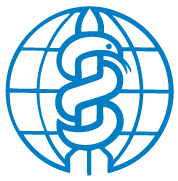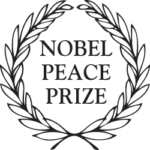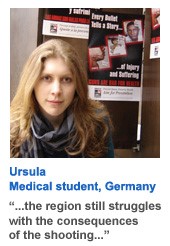Ursula
Germany, physician (note: this was written when she was a medical student)
“Have you heard about the school shooting in the South of Germany? Isn’t that where you come from?” It’s early in the morning, rounds have just begun, and my American coworkers at the hospital are worried.
The news is all over the internet: A 17 year old boy shot 15 people and finally committed suicide with his father’s gun, everything happening 10 minutes away from where my family lives. In Arizona on medical training, I feel far away from the media craziness and the highly emotional debates developing in Germany. Who’s to blame? Did the preceding shooting in Alabama serve as a trigger, is it all about violence in video games? Would stricter laws for gun ownership be an adequate preventive measure?
Four weeks later, I am back home. The local newspaper proudly announces that following the shooting, almost 400 firearms of all kinds and 250 kg of ammunition have been voluntarily handed in so far. I wonder how many more bullets are still stored by my neighbours, leading to a horribly dangerous illusion of security. The camera crews have left, but the region still struggles with the consequences of the shooting, and there’s loss everywhere. As a medical student and future doctor, I want to protect people from harming themselves and others with those deadly substitutes for trust and self-esteem.
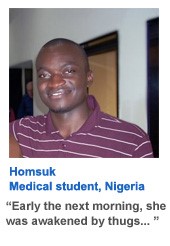 Homsuk
Homsuk
Nigeria, Physician (note: this was written when he was a medical student))
I remember saying good bye to my friend and classmate (medical student) shortly after a tutorial on a fateful evening, only to wake up the next morning to hear she was trapped in the midst of fighting during the recent ethno-religious/political crisis in Jos, Nigeria November 2008. I recall how she kept calling me to recount her ordeal in fear as the day passed! She had to leave the students lodge towards night fall to seek safety in a retired General’s house nearby, after it was rumoured that the lodge was to be attacked the next morning. Early the next morning she was awakened by shouting thugs, who unleashed destruction of property in the neighbourhood, using light weapons, clubs, knives and locally made bombs.
If not for a distress call for help by the General, so many students would have lost their lives in few minutes, as the thugs exchanged fire with the security agents on duty at his house. However, in some other part of town, three medical students sustained bullet injuries. One eventually died from complications of gunshot wounds.
The crisis is now over, but the psychological trauma still lingers in the mind of these students. Why should students be the target and be at the receiving end of small arms violence? How come more than a truck load of ammunition is smuggled to parts of the region so easily?
As a medical student I have experience firsthand the effects of such violence on health.
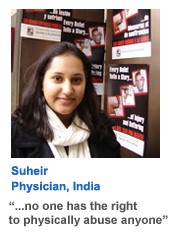 Suheir
Suheir
India, physician
My mom had come to visit me at my medical school during that week and we were heading back home together on a train for the weekend. While all the passengers were calmly seated, I heard a girl screaming and asking for help. Initially, I could not understand where the scream came from. Suddenly, I noticed an adolescent girl being chased by a heavy built man through our train compartment. Like everyone else, I stood up to see what’s going on and I saw the man, who was drunk, beating the girl in the corner of the compartment. I could see people standing around and being witnesses to the crime. I cried out to my mother and asked for help. In the entire compartment, she was the only person who went up to the man and stopped him. He left our compartment immediately. But the people sitting next to us did not like the idea of saving the girl because they thought she was probably a thief. I felt sad. I strongly feel, no one has the right to physically abuse anyone and I was upset for the unfair assumptions that kept those people away from helping the girl. We stayed with the girl until she was in safe hands and I felt thankful to my mother for her courage. That day, I really felt motivated to stand against violence.
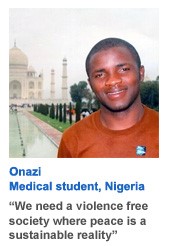 David
David
Nigeria, physician (note: this was written was he was a medical student)
Driving through the streets of Jos where I reside in Nigeria, I saw the ruins of the November 2008 riot, yet my heart could not fully apprehend the height of the hurt in people’s heart.
I remember the voice of my friend at the other seat of the car when he recounted in my ears how a close friend of ours was shot, with attendant penetrating and blunt injuries; I tried to find my voice and a little empathy ensued. Three of the bullets are yet to be removed from his body for fear of further injuries owing to the delicacy of the affected body tissues.
I join my voice with other voices in IPPNW to let the world know that we need a violence free society where peace is a sustainable reality. It is a burden that has a voice in my soul and my heart is ready to go the second mile. I fantasize that my moments as a doctor will be moments of advocacy for peace.
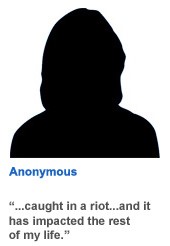 Anonymous
Anonymous
Activist
I want to talk about an experience I had and the motivation for me to be in the United States had to do with violence, that happened when I had just graduated from the University in my home country, and I was caught in a riot there about which I don’t remember, and it has impacted the rest of my life.
I think it has played a major role in why I have become, starting about 10 years ago, involved in social change activism. On the one hand it damaged my health terribly, which came out later in life, and on the other hand, in order for me to cope with the rage that I felt, which I did not know where this rage came from, only through help from a physician who helped me to realize that I had this very, very deep rage inside of me, that possibly led to a brain tumor, possibly led to other medical issues, that in order to cope with that, and not engage in self harm or other harm, I became involved in social change activism focusing on racism and sexism and I’m now graduating, having finished writing my dissertation on the issue of multigenerational racism and sexism.
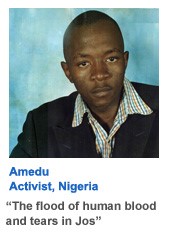 Amedu
Amedu
Nigeria, activist
A fellow activist in the field of research, development, education and community health volunteerism once told me something during a discussion we were having in his Abuja residence on the trafficking, proliferation and use of small arms within a country such as in Nigerian context. He said “Monday, the truth is that it may not be out of place to say that at least over 2.5 million illegal small arms and light weapons could be in circulation in Nigeria today.” I didn’t believe him and never even wanted to count that statement as reality since then, until recently when with my two eyes I saw and beheld the wanton waste caused by hoodlums and furious unemployed youth/adult, who used all forms of illicit and sophisticated small arms and light weapons in carrying out the merciless and brutal killings, maiming and destruction of life-time properties through violent conflict that befell the calm city of Jos in November 28, 2008.
This is what I called the flood of human blood and tears in Jos—-after the curfew for the elections was lifted at about 4.pm on Thursday, everyone left for their homes to await the announcement of results, which never came till the following Friday morning: 27th day of November, 2008 when all of a sudden, children, women, youth and men – all manner and everybody was running out of their homes to the main-road of Tudun Wada, the area I reside in Jos. By the time I followed suit to the road, I discovered the atmosphere was already tensed, “the September ninth 2001 thing has started up again” I whispered within me. And a little while, news came in that a Church was set ablazed at a location afar off where I was. Before I knew it, my area also was surrounded by smoke on all sides – dark undoubtedly black smoke rose up strongly, which later mixed up with white smoke. Houses were on fire; tires
